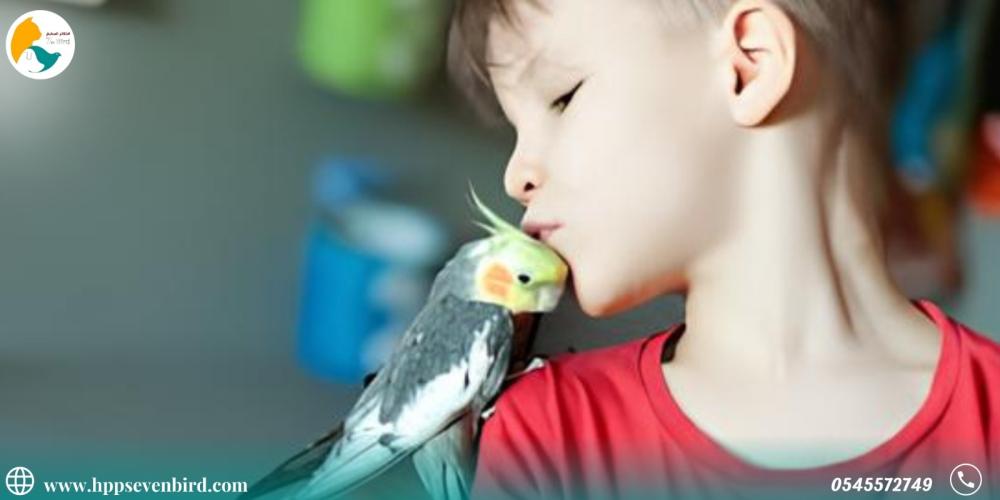If you own a pet bird or parrot, you know all too well that your life with them isn't all beautiful singing and gentle whispers. There are times when those sounds become loud screams that leave you wondering, "What's going on? Why all the noise?"
The secret is that these "screams" aren't just random noises. They're a sophisticated language and a vital means of communication for them. To understand them, we must go back to their wild origins and view the world from their perspective.
: Their Wild Instinct: Communicating Across Distances
In the wild, parrots, lovebirds, and cockatoos live in large flocks across vast forests. Screaming is their way of staying in touch:
· Calling to the flock: "Where are you? I'm here!" to identify locations and gather.
· Warning of danger: A sharp alarm cry to inform others of the presence of a predator.
· Mating call: To demonstrate strength and attraction to a mate.
Dawn and Dusk Screaming: Early in the morning and before sunset, flock screeches reach their peak. This is a daily ritual to confirm the flock's presence and plan their day. Your pet bird still retains this powerful instinct!
: Reasons for Screaming at Home (and What They're Trying to Tell You)
When your bird makes a loud noise, they're trying to tell you something. Here are the most common reasons:
Boredom and lack of stimulation: This is the number one reason! Birds are very intelligent and need mental and physical challenge. If they're confined in a small cage without toys or interaction, screaming is their way of saying, "I'm bored! I want something to do!"
So we've dedicated this to you from the seventh bird:
Seven Bird Wooden Stand with Bird Swing
· Desire for attention: Noticed you left him and went to another room? He'll scream, "Come here! I miss you!" The problem is if you always respond to his screams, he'll learn that screaming is the key to getting your attention.
· Fear or stress: A sudden noise (a vacuum cleaner, a slammed door, a stranger in the house) can trigger a scream of fear It's a natural reaction to perceived danger.
Happiness and excitement: Not all screams are bad! Your bird may scream happily when you come home, when it's time to play outside the cage, or when it sees a favorite food.
So, we've dedicated this to you from seventh bird:
Seven Bird Cage and Rodent Ladder
· Expressing needs: Hunger, thirst, or even the desire to sleep can manifest in loud sounds.
· Mimicry: Parrots are known for mimicking sounds. If you turn up the TV volume or speak loudly at home, they may believe this is the normal volume they should use.
How to Deal with Excessive Screaming (Without Hurting Your Bird's Feelings)
Punishment or yelling at your bird is never the solution. This will reinforce the behavior or cause fear and hesitation. Instead, focus on understanding the cause and redirecting it.
1. Provide a rich environment: Offer your bird a variety of toys (chew toys, puzzles, hanging toys), and change them regularly to prevent boredom. The cage should be large enough for him to fly or climb.
So, we have dedicated this section to you from seventh bird:
Pets Life Baby Bird Food Hand Feeder 150g
2. Daily Interaction Time: Birds are social animals. Set aside time each day to play with them outside the cage, talk to them, and train them with treats.
3. Ignore Screaming (The Golden Strategy): When they scream for attention, don't look at them, talk to them, or walk toward them. Be patient Wait until he calms down for a moment (even if only for a second), then praise him and give him attention or a treat. He'll learn that calmness is what attention brings.
4. Reward calmness and gentle speech: When he speaks or whistles quietly, praise and reward him. Encourage the sounds you like best.
So we've dedicated to you from the seventh bird:
Vitakraft Cracker Treats for Rose and Fischer's birds with Honey and Sesame 180g
Lulu Pets Nutritional Treats for Rose and Fisher Birds, Honey Flavor, 2 Pieces, 90g
Birds and parrots rewards cuttlefish bones 6 pieces with small stabilizer from Prevo
5. Check your bird's basic needs: Make sure it has clean food and water, and that its cage is secure and away from direct drafts.
Therefore, we have dedicated this seventh bird:
Vinci Nutritious Food for Canaries 5kg
Perlyna stepu Food for medium sized tropical birds 1kg
Seven Bird Natural Cuttlefish Bone for Birds
6. Routine is key: Try to stick to a consistent daily routine for eating, playing, and sleeping (10-12 hours of darkness and quiet for sleeping). This gives them a sense of security.
Conclusion: Screaming is communication, not a problem.
The next time your parrot raises his voice, stop and think: "What is he trying to say?" instead of "How can I make this noise stop?"
Understanding the reasons for your bird's screaming is the first and most important step toward a more harmonious relationship. Accept that some screaming is completely normal—it's the nature of being friends with a bird brimming with energy, intelligence, and personality!
Note: If the screaming is sudden, persistent, and unusual for your bird, it may be a sign of illness or pain. In this case, it's advisable to consult an avian veterinarian to rule out any health causes.

